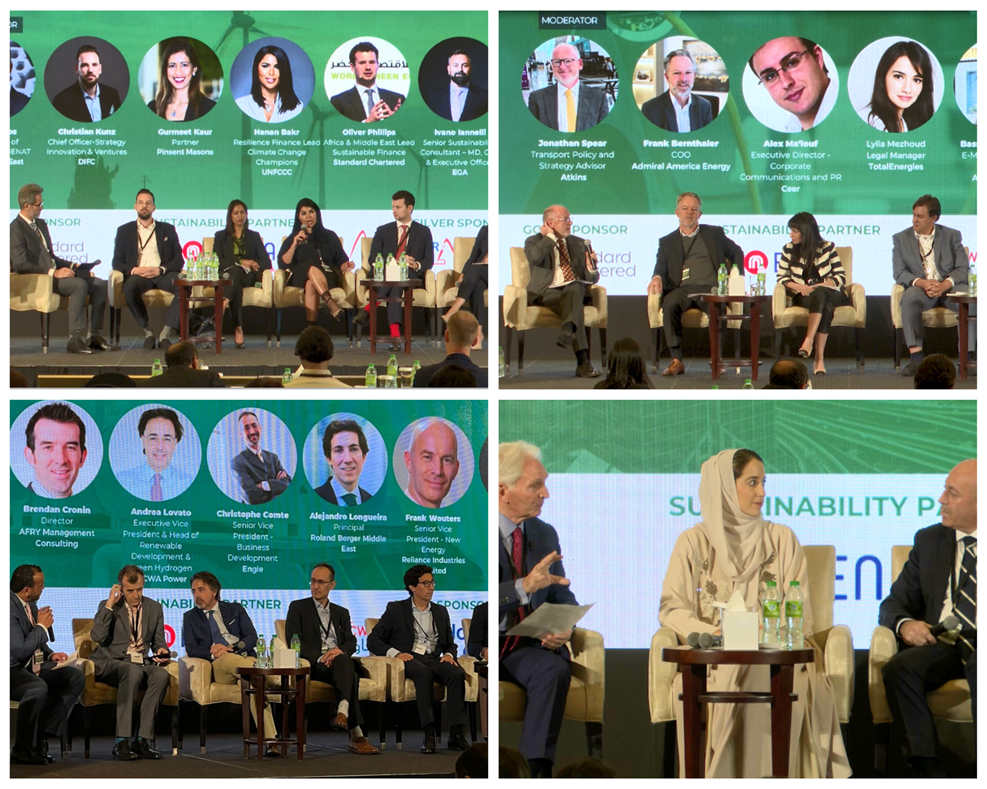The Clean Energy Business Council annual summit focused on COP28
The Clean Energy Business Council (CEBC) hosted the 10th CEBC Annual Summit at the end of January, at the Shangri-La Hotel Dubai, with a main focus on the highly anticipated 28th session of the Conference of the Parties (COP28) to the United Nations Framework Convention on Climate Change (UNFCCC) which will take place in the UAE between November and December 2023 at Expo City Dubai.
A well-curated audience of 150+ energy efficiency, sustainable finance, future mobility, and clean hydrogen professionals, representing 100+ CEBC stakeholders, attended the summit for networking, knowledge sharing, and engaging in discussions with over 34 speakers and panelists who are experts in their fields, from diverse sectors and perspectives on clean energy. The purpose of this year's discussions was to lay the groundwork for an action oriented COP28 in the UAE.
Standard Chartered, Enova, Johnsons Controls, and ACWA Power sponsored the summit, demonstrating the significant role the CEBC members play in the development and deployment of clean energy in the MENA region. Alongside the summit’s sponsors, major leading companies and organizations such as the Dubai Supreme Council of Energy, Dubai International Financial Centre (DIFC), the International Renewable Energy Agency (IRENA), Abu Dhabi Energy Services (ADES), United Nations Development Programme (UNDP), TotalEnergies, Schneider Electric, Dentons, ABB, Cummins Arabia, Pinsent Masons, Honeywell, and HSBC were represented during the summit.
Dr. Nasser Saidi, Founder & Chairman of the CEBC, commenced the summit with an opening keynote titled "A New Global Energy Map," in which he stated that despite the MENA region being the most vulnerable to climate change, the region is anticipated to be at the core of a new transformed global energy map.
Dr. Rabia Ferroukhi, Director of the Knowledge, Policy, and Finance Center (KPFC) at the International Renewable Energy Agency (IRENA), also presented an outstanding keynote presentation under the theme of "The New Energy Paradigm," which emphasised the importance of a holistic policy framework for dealing with the energy transition. This framework incorporates not only the environmental, but also the economic and societal aspects.

The event featured five panel discussions tackling climate finance, energy efficiency, future mobility, clean hydrogen, and the Road to COP28
Key Takeaways:
Climate Finance
Panelists agreed that regulators can support the evolution of sustainable finance by setting clear and credible standards and regulations that support technologies, initiatives, and the private sector in addition to ensuring the integrity of voluntary carbon markets, which are gradually being established in the MENA region, such as in the UAE, Saudi Arabia, Qatar, and Egypt, with the rest of the region anticipated to follow.
Energy Efficiency
The panel addressed three main discussion points: decarbonization, building codes, and research and development. The panelists emphasized that energy efficiency is essential for achieving net zero ambitions, with high priority given to efficient building appliances, aggressive retrofit programs, digitalization, and decentralization of the energy system, noting the important role, research and development plays within universities and industries.
Future Mobility
It was stated that the growth of city-wide charging stations is slower than that of EV users and many residential rental property owners do not permit the installation of EV charging networks, which makes potential customers who want to switch to EVs hesitant. As such, the size and reliability of the existing EV charging infrastructure must be improved if electric transport is to become the preeminent mode of personal mobility.
Clean Hydrogen
Panelists discussed the challenges to achieve a larger-scale clean hydrogen market in the region, with a focus on financing, trading models, standards, and certifications. More activities of the development of projects are urged to be handed over to the private sector, mobilizing renewable technologies, and collaborations are the pillars of driving the green hydrogen agenda and market moving forward.
Road to COP28
This panel discussion upon the key elements needed to achieve an actionable COP28 in Dubai. The COP28 Partnerships team stressed their commitment to their five key pillars: mitigation, adaptation, loss and damage, finance, and the private sector. A key takeaway of the discussion is that further financial reforms are required to unlock private and public financing into climate change initiatives, and it is crucial to focus on energy efficiency, decarbonization, and scaling up renewables as a percentage of the energy mix and accelerate non-state actor implementation to decarbonize their industries.
The agenda also included four outstanding presentations focusing on "the Building Blocks for Developing an ESCO Market in the MENA," "The Role of Energy Efficiency in the Net Zero Transition," "Harnessing Low-Carbon Hydrogen Potential in the MENA Region," presented by Mohammed Ayoub, General Manager - Power Transmission Services, GE Vernova, and Board Member of the CEBC, in addition to a presentation by Marina Antonopoulou, Director for Climate and Nature Conservation, Emirates Nature-WWF which the CEBC is a proud partner of. During the presentation, Marina highlighted the need to achieve science-based solutions to combat climate change in the UAE.
KEEPING THE ENERGY INDUSTRY CONNECTED
Subscribe to our newsletter and get the best of Energy Connects directly to your inbox each week.
By subscribing, you agree to the processing of your personal data by dmg events as described in the Privacy Policy.















